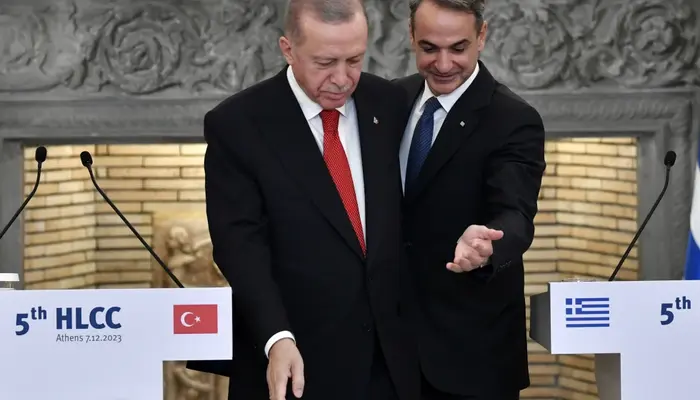Turkey and Greece, regional rivals with a history of tense relations, are working to improve diplomatic ties and address long-standing issues in the Aegean and Mediterranean. In a recent meeting, Turkish Foreign Minister Hakan Fidan and Greek Foreign Minister George Gerapetritis agreed to pursue dialogue to promote stability and cooperation, sparking renewed hope for peace in the region. Both ministers emphasized the importance of transforming historical rivalry into a long-term partnership.
Moving Forward with Dialogue
In a joint press conference, both Fidan and Gerapetritis expressed optimism for turning Greece and Turkey into enduring allies. “We must seize the historic opportunity ahead of us and make the positive climate between our countries permanent,” said Fidan, while Gerapetritis echoed this commitment to fostering sincere and constructive dialogue. Although no specific agreements were reached, both sides demonstrated a willingness to keep discussions open to resolve the issues straining their relationship.
Aegean and Mediterranean Tensions
A major point of contention between Turkey and Greece is the Aegean Sea, where both countries have overlapping territorial claims. Greece, under United Nations regulations, asserts its right to extend its coastal boundaries to 22 km (14 miles). Turkey, however, opposes this expansion, warning it could escalate tensions. Additionally, the two countries have disputes over exclusive economic zones in the eastern Mediterranean, where resources such as oil and gas add layers of complexity to their relationship.
Read: UAE Strengthens Investment Ties with Pakistan
Migration Pressures and Cooperation
Migration has also fueled tensions, as both countries are critical gateways for migrants entering Europe. Greece has urged Turkey to crack down on human smugglers, especially as migrant camps on Greek islands like Samos have become overcrowded. The Samos camp, built to house 3,500 people, now shelters over 4,000, with unsanitary conditions and limited space forcing many to sleep in kitchens and other shared areas. This situation highlights the need for a joint effort between Greece and Turkey to manage migration effectively and humanely.
Steps Toward International Arbitration
To further stabilize their relations, Greece and Turkey are discussing the potential for arbitration at the International Court of Justice (ICJ) in The Hague. However, both sides approach arbitration with differing agendas. Greece is willing to discuss the continental shelf boundary, while Turkey insists that additional issues, such as territorial waters, be included. This arbitration initiative reflects a shift toward legal resolution rather than military confrontation, underscoring the shared commitment to diplomacy.
Cooperation for Regional Stability
The current political climate presents a unique opportunity for Turkey and Greece to work on broader regional issues, including energy and migration. Vehbi Baysan, a professor at Turkey’s Ibn Haldun University, notes that the political will for collaboration has never been stronger. “We’re talking about energy channels from Middle Eastern countries extending to Greece and Central Europe, as well as migration challenges,” Baysan explains, adding that cooperation is essential for peace and prosperity in the region.
A Diplomatic Path Forward
Despite their complex history, Turkey and Greece are showing renewed dedication to finding peaceful solutions to their long-standing issues. By keeping diplomatic channels open and seeking common ground, both countries are taking significant steps toward a stable and cooperative relationship. While obstacles remain, their commitment to dialogue could help pave the way for long-lasting peace and regional stability.
Follow us on Google News, Instagram, YouTube, Facebook,Whats App, and TikTok for latest updates
